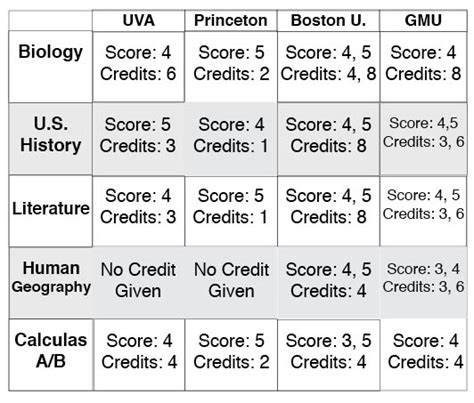Navigating the Landscape of AP Credit

Advanced Placement (AP) courses provide high school students with the opportunity to engage in college-level coursework while still in secondary school. AP credit can play a significant role in your academic journey at Washington University in St. Louis (WashU).
Benefits of AP Credit at WashU
- Accelerated Degree Completion: AP credit can allow you to place out of introductory courses, freeing up your schedule for more advanced coursework or double majoring. According to the College Board, students who take AP courses in high school are 2.5 times more likely to earn a bachelor’s degree within four years.
- Enhanced Academic Preparedness: AP courses provide a rigorous curriculum that closely aligns with university-level coursework. Taking AP courses can help you develop critical thinking, problem-solving, and writing skills essential for academic success.
- Cost Savings: AP credit can significantly reduce your college tuition expenses. Each AP exam you pass could potentially save you thousands of dollars over the course of your degree.
Earning and Using AP Credit
- Take AP Exams: To earn AP credit, you must take official College Board AP exams at the end of the AP course.
- Meet Score Requirements: WashU typically awards credit for scores of 4 or 5 on AP exams. The specific score requirements vary depending on the department and course. Consult the “AP Equivalencies” section of the WashU Course Catalog for details.
- Submit Scores: Once you receive your AP exam scores, submit them to WashU’s Office of Admissions or the relevant academic department.
AP Credit Availability and Options
WashU offers AP credit equivalencies for a wide range of subjects, including:
- Arts: Art History, Drawing, Music Theory
- Humanities: English Literature, History, Spanish Literature
- Sciences: Biology, Calculus, Chemistry, Physics
- Social Sciences: Economics, Environmental Science, Government, Psychology
Additional Considerations
- Majors: Some majors at WashU may require specific AP courses or scores for admission. Consult with the relevant academic department for specific requirements.
- Transfer Credit: AP credit can also be transferred to WashU from other colleges or universities. However, transferability and eligibility for credit may vary.
- Limitations: WashU does not accept AP credit for certain introductory courses, such as undergraduate writing courses.
Effective Strategies
- Consult with Advisors: Meet with your high school counselor and WashU admissions representatives to discuss your AP course selection and plan.
- Take AP Courses that Align with Your Interests: Choose AP courses that you are passionate about and that will support your future academic goals.
- Study Consistently: Dedicate time to regular study and review for your AP classes to improve your chances of scoring well on the exams.
- Utilize Resources: Take advantage of resources offered by your school and WashU, such as AP review sessions and online preparation materials.
- Seek Support: If you encounter difficulties in an AP course, reach out to your teacher or a tutor for assistance.
Common Mistakes to Avoid
- Procrastinating: Don’t wait until the last minute to begin studying for AP exams. Start preparing well in advance to avoid feeling overwhelmed.
- Overestimating Your Abilities: Be realistic about your course load and don’t try to take too many AP courses. It’s better to focus on excelling in a few courses than spreading yourself too thin.
- Neglecting Other Responsibilities: AP courses are demanding, but it’s important to prioritize other aspects of your life, such as extracurricular activities and personal well-being.
- Relying Solely on AP Credit: While AP credit can be valuable, it’s not a replacement for completing a full college degree. Use AP credit as a foundation for your university studies.
Table 1: AP Credit Equivalencies for Engineering
| AP Course | WashU Equivalency | Hours |
|---|---|---|
| AP Calculus AB | Engineering Calculus I | 4 |
| AP Physics C: Mechanics | Physics I | 4 |
| AP Chemistry | Chemistry I | 4 |
| AP Computer Science A | Introduction to Programming | 3 |
Table 2: AP Credit Equivalencies for Business
| AP Course | WashU Equivalency | Hours |
|---|---|---|
| AP Economics Microeconomics | Principles of Microeconomics | 3 |
| AP Economics Macroeconomics | Principles of Macroeconomics | 3 |
| AP Statistics | Statistical Methods | 3 |
| AP Psychology | General Psychology | 3 |
Table 3: AP Credit Equivalencies for Arts & Sciences
| AP Course | WashU Equivalency | Hours |
|---|---|---|
| AP English Literature and Composition | Introduction to Literary Studies | 3 |
| AP US History | US History to 1877 | 4 |
| AP Environmental Science | Environmental Science | 3 |
| AP Spanish Literature | Spanish II | 4 |
Table 4: Benefits of AP Credit
| Benefit | Details |
|---|---|
| Accelerated Degree Completion | Reduced course load and potential for early graduation |
| Enhanced Academic Preparedness | Improved critical thinking, problem-solving, and writing skills |
| Cost Savings | Thousands of dollars in tuition savings per AP exam passed |
| Major Exploration | Opportunity to explore different academic disciplines before college |
Conclusion
AP credit provides numerous advantages for students who plan to attend WashU. By strategically incorporating AP courses into your high school curriculum, you can accelerate your academic progress, enhance your preparedness for university-level work, and potentially save on college expenses. Embrace the opportunities offered by AP credit and unlock the pathway to success at WashU.
